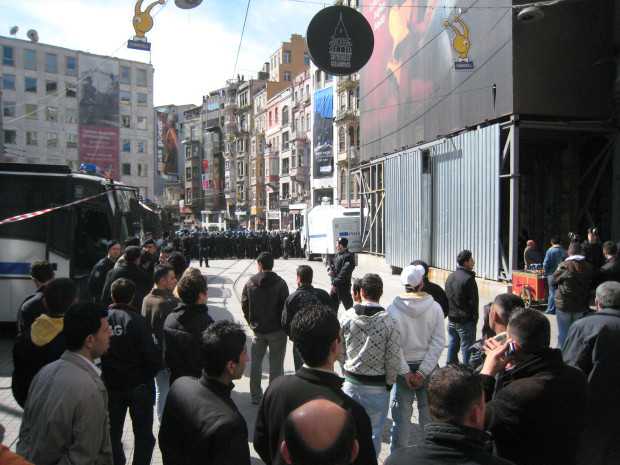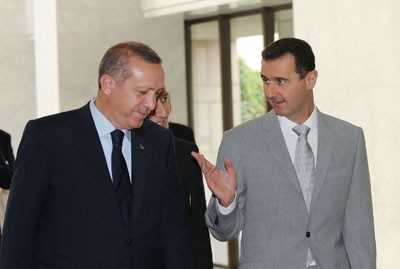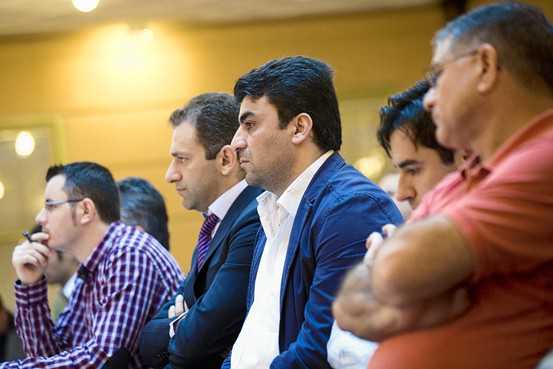Settled in the Middle East since ancient times, the Kurds remain the largest ethnic group without a state of their own in the region. About 35 million are split between Iran, Iraq, Syria and Turkey, with small diaspora groups primarily in Armenia and Azerbaijan. The Kurds’ present situation is rooted in the decision to partition areas of the former Ottoman Empire by Great Britain and France after World War I. Today, the Kurdish people struggle for self-determination and the recognition of their ethnic identity within nations where they have significant populations. For example, it is illegal for them to speak their language in Turkey, and the country’s constitution provides for only one ethnic designation, Turkish, thus disavowing the very concept of Kurdish ethnicity. There is little consensus between the many Kurdish groups as to how best to achieve their goals. Overall, Kurdish history in all four states with native Kurdish populations over the last hundred years has been mostly marked by cultural discrimination from ruling regimes, spotted with frequent rebellious uprisings that were violently suppressed.
The different roots of Kurdish nationalism
The Kurds are a distinct ethnic group of Iranian origin with their own language and culture. In modern history, they are also united by a desire for greater autonomy, and, ideally, a state of their own, as well as a shared history of discrimination and oppression from each regime in question. “Self-determination is the right of the Kurdish people,” said Iraq’s president Mr. Jalal Talabani, an ethnic Kurd, in an interview with Le Figaro, published on October 31, 2006.
The causes of clashes between Kurdish minorities and central governments have been different in each country. Kurdish nationalism in Turkey was primarily a reaction to Turkish nationalism in the newly-founded republic. The country’s course toward secularization under the Kemalist ideology (a movement developed by the Turkish national movement leader, Mustafa Kemal Ataturk), which emphasized the absence of religious influence from all public institutions, conflicted with the devout Muslim Kurds’ world view and was a major reason for the rise of the nationalist movement.
Iranian Kurds always bore some discrimination, according to Amnesty International, such as inability to register newborns with certain Kurdish names and difficulty obtaining employment or adequate housing. Such policies reached their zenith in 1979 with the Islamic Revolution. The desire of nearly 2.5 million Sunni Kurds for regional autonomy caused Ayatollah Khomeini, spiritual leader of predominantly Shia Iran, to declare jihad (holy war) against them. Shia Kurds, on the other hand, were untouched by the Ayatollah’s decree and did not face discrimination from the Iranian government. Neither have they ever really desired autonomy or independence from Iran due to religious homogeneity with the rest of the population. Shia Kurds have held or currently hold key positions in the Iranian political hierarchy, such as First Vice President Mohammad-Reza Rahimi and former Foreign Minister Karim Sanjabi. In fact, in recent history, the Sunni denomination of Islam has traditionally been discriminated against in Iran regardless of the ethnic group involved. For example, according to Sunni-News, in March of this year, Iranian authorities have forbidden the annual forum of Sunni students set to be held in the town of Zehan.
Ethnic, rather than religious, differences were the cause of the Kurdish nationalist movement in Iraq, according to the analysis of Ms. Denise Natali, a lecturer at the Center for Law and Politics at Salahaddin University in Iraqi Kurdistan, in her book The Kurds and the State. She cites a forceful “Aribization” campaign, which started in 1963 with the rise of the Ba’ath party to power. The initiative involved the ban of the Kurdish language, deportation and ethnic cleansing. The government did propose a plan, which provided for a degree of Kurdish autonomy in 1970. However, according to Mr. George Harris, a Near East history scholar at the Middle East Institute, this was combined with a forceful resettlement program, in which the government tried to settle traditionally Kurdish areas with citizens of Arab ethnicity. The Kurds comprise a lesser percentage of the population in Syria than in the other countries as most of them emigrated from neighboring Turkey. It is for this reason that Syrian Kurds have long been regarded as foreigners by the ruling Ba’ath regime, and thus, were not allowed to participate in elections or travel abroad as Syrian citizens. They were extended some civil liberties as a result of the protests last winter, but some, like the Syrian Kurdish opposition activist Mr. Shirzad Al-Yazidi in an interview with Asharq Alawsat newspaper, call to “look to the recent declaration of democratic autonomy in the Kurdish region of Turkey” as a model for attaining a greater degree of independence for Syrian Kurds. Unlike their Turkish or Iraqi counterparts, however, Syrian Kurds do not seek independence, but rather a wider spectrum of civil rights within the country, such as equal employment opportunities. Mr. Fawzi Shingar, a Syrian Kurdish leader, remarked to Rudaw in English that despite the lack of a common agenda between the many Kurdish groups, “no Kurdish party wants independence from Syria because the Kurds are an inseparable part of the country.”
The struggle for Kurdish independence has often been violent. In the interwar period, Turkey saw an average of three revolts per year. The most well-known of the militant groups, the Kurdistan Workers’ Party (PKK), has been in existence for 33 years and has been leading an armed struggle against the Turks for 27 years. Their official agenda is independence from Turkey and possible unification with other Kurdish-populated areas in Iran, Iraq and Syria. The PKK is labeled a terrorist organization by the United States and the European Union for its violent actions such as the suicide bombing in Ankara in 2007. In her 2007 book Blood and Belief, Reuters political analyst Ms. Aliza Marcus contends that the PKK guerillas would stop fighting if offered amnesty and certain liberties for Turkey’s Kurdish population. Ms. Marcus also notes that any legitimacy to their demands is countered by their fervent devotion to PKK’s recently retired leader Mr. Abdullah Ocalan, who stressed armed struggle as a means for complete secession of Northern Kurdistan from Turkey.
Other militant groups include the Free Life Party of Kurdistan (PJAK), which has been in regular confrontations with the Iranian government. The most recent incident, as reported by Reuters, occurred last July, involving the assassination of General Abbas Kasemi of the Islamic Revolutionary Guard Corps, an elite division in the Iranian army. Iran responded with an armed incursion of 5,000 men into northeastern Iraq’s Kurdish region, accusing the head of Iraqi Kurdistan of illegally sponsoring PJAK activity. Several towns were shelled by Iranian artillery. Despite constant assurances of a victory made by either side, the conflict went on until complete PJAK surrender on September 29.
The statehood question
What is to be done about this situation? Some, like British journalist Mr. David Osler of Lloyd’s List, compare the Kurdish problem to the Israeli-Palestinian conflict. Naturally, such a comparison brings to mind the familiar one-state vs. two-state solutions. Mr. Daniel Greenfield, a journalist for The Kurdistan Tribune, strongly advocates a completely independent Kurdistan, stating that it would be otherwise impossible for Turkey to enter the EU. “Only by allowing an autonomous Kurdish state within the borders of occupied Northern Kurdistan, will Turkey gain stability and peace,” writes Mr. Greenfield in a blog post from June 20, 2011. He asserts that Turkey’s acceptance into the EU without resolving the Kurdish question will exacerbate ethnic conflicts and undermine the EU’s credibility. However, there are matters other than the Kurdish question that bar Turkey’s entrance into the EU, such as the issues of Cyprus and foreign relations with Greece.
The Kurds find themselves in a complicated situation, at least geopolitically speaking, considering the sheer number of nations and potential negotiations involved. Taken within the greater scope of all of Kurdistan, a two-state solution entails carving out sizable portions of Iran, Iraq, Syria and Turkey. This means that each Kurdish minority will have to negotiate with its respective government, and none of these states are inclined to simply give up territory. Iraqi Kurds are in constant contest with the central government for the oil-rich region of Kirkuk. The Kurds inhabit a large portion of Turkey. Syria, with the partition of the country under the French Mandate still fresh in the nation’s consciousness, will most likely not agree to give a piece of its land to its Kurdish residents, despite recent advances such as President Bashar Al-Assad’s granting of Syrian citizenship to the country’s large Kurdish population.
As such, more moderate solutions have been proposed. Mr. Michael Gunter, a professor of political science at Tennessee Technological University, in his 2007 book The Kurds Ascending, sees the solution in an education system that provides a belief “in democracy for all people regardless of ethnic affinity.” Dr. Gunes Tezcur, who teaches political science at Loyola University, points to more serious issues that must first be resolved. In particular, he recommends the cutting of funding from Iraqi Kurds to militant groups such as the Kurdish Freedom Falcons and PKK in Turkey and an acknowledgement of the Turkish government’s civil rights violations by the EU. Some experts, like Yale University’s political science lecturer Mr. Matthew Kocher, believe more moderate solutions have a better chance of success in satisfying all sides involved to some degree than four separate and costly two-state solutions. “The median Kurdish voter probably supported center-right Turkish political parties,” writes Mr. Kocher in his 2002 paper “The Decline of PKK and the Viability of a One-State Solution in Turkey,” which was published in the MOST Journal on Multicultural Studies. He describes the position of Turkish Kurds regarding integration into the state. In light of the Syrian Kurds’ attitude of remaining within Syria voiced by Mr. Shingar and the autonomy granted to Iraqi Kurds by Iraq’s new constitution, it is possible that one-state solutions are gaining popularity. This is indeed a step toward settlement, even though more remains to be done for reconciliation.

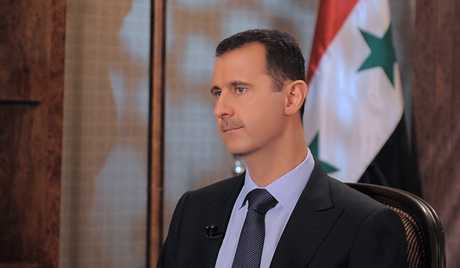
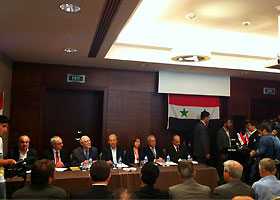 ISTANBUL- Syrian dissidents meeting in Turkey have formally announced the creation of the final Syrian National Council. The structure and aims of this council were announced Sunday at a news conference in Istanbul.
ISTANBUL- Syrian dissidents meeting in Turkey have formally announced the creation of the final Syrian National Council. The structure and aims of this council were announced Sunday at a news conference in Istanbul.